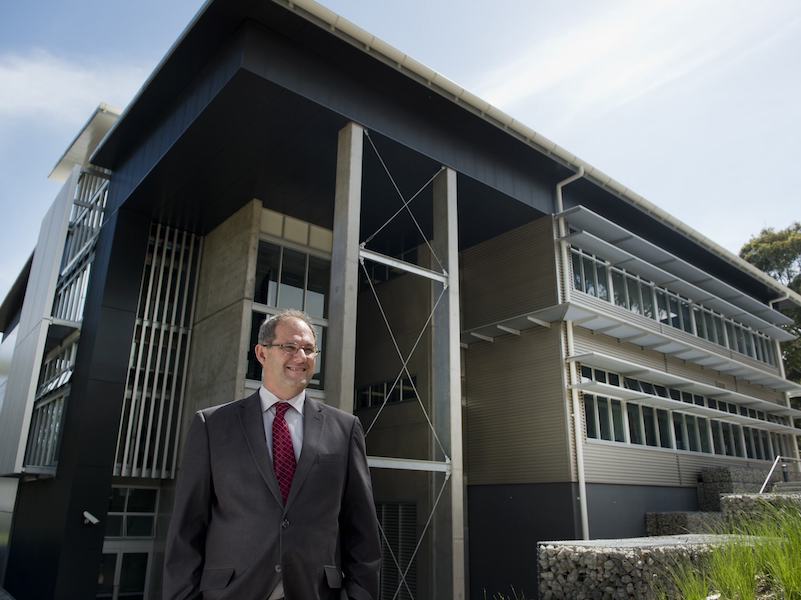Researcher Highlights
NIER: Global leaders in research
Alan Broadfoot
Prof Alan Broadfoot is the Executive Director of the Newcastle Institute for Energy and Resources (NIER), one of the University’s flagship research institutes established a decade ago to provide practical and viable benefits to industry through a collaborative engagement model.
Largely focused on challenges in the energy and resources sectors, NIER’s research agenda has recently expanded to encompass energy, resources, food and water, focused on creating solutions to address critical issues in these areas. NIER’s collective capacity delivers expertise including:
- Resource productivity and efficiency, including advanced beneficiation technologies and bulk solids handling and storage technologies;
- Energy technologies and utilisation, including low emission and renewable energy systems and fuels, materials and energy utilisation and storage;
- Advanced materials for industrial innovation, including electrochemistry, advanced nanomaterials and organic electronics; and
- Land, water, social impacts and sustainability, including climate, land and water management and remediation.
NIER’s objective is to facilitate industry-academia collaborations to develop solutions, improve efficiencies and ultimately give our industry partners a competitive edge in areas of national significance with both local, regional and global reach. Sustainability underpins the broader NIER vision.

Under Alan’s leadership NIER has grown to host over 360 staff, across 19 research centres at the NIER Precinct – a 3.8 hectare footprint, providing multiple offices, labs and workshops, hosting some of the largest industrial research facilities in Australia.
Over 250 PhD scholars partner with around 160 active industry partners engaged in collaborative research projects with our academics, with NIER collectively securing over $164 million in funding between 2011 and 2019.
NIER also facilitates initiatives including the NSW Government’s Energy and Resources Knowledge Hub, which supports strong links between industry, research organisations and government to drive innovation and growth for Australia’s energy and resources sector, and the Pacific Node, which provides a supporting framework for critical, regionally relevant research in areas including climate resilience and adaptation. Some key achievements over the last decade include:
- The launch of the ARC Industrial Transformation Centre for Advanced Australian Iron Ore Technologies under the leadership of Laureate Prof Kevin Galvin
- $35 million funding under the federal government’s Coal Methane Abatement Technologies Support Package under the leadership of Prof Behdad Moghtaderi
- Ongoing funding of BHP funded research group, the Centre for Ironmaking Materials Research – a partnership worth $15 million over ten years
- The establishment of the Pacific Node in partnership with SPREP (Secretariat of the Pacific Regional Environment Programme) aimed at enhancing regional capability by harnessing collective capacity to solve environmental issues with targeted PhD scholarships
- The establishment of the University’s first Doctoral Training Centre (in Advanced METS – Mining Equipment, Technology and Services)
- Infrastructure projects including the construction of NIER C Block and the Glasshouses
“NIER’s vision is to drive global impact by creating ambitious solutions to enhance sustainability across our industries.
“Recently, we’ve been expanding our focus into the water and food industry. We do this by ensuring our lead researchers, capacity building initiatives, and relationships with industry partners are positioned to best assist these sectors.
“Food producers, manufacturers and farmers are under increasing pressure to reconcile a number of complex and competing challenges around quality and efficiency, health and environmental sustainability and food security. NIER is positioned as a major enabler of innovation, delivering scientific and technological advances to improve productivity, efficiency and ultimately competitiveness for the food and agribusiness sector.
“Similarly, the safeguarding of our water resources in Australia, and internationally, is a shared challenge calling governments at all levels, research institutions, industry and communities to work together to meet our future water needs.
“We’re committed to delivering the highest quality research that informs decision making and policy to provide improved security and greater resilience in these sectors for regional and urban centres.
“The outcomes we’re seeing at NIER, and the benefits being delivered to our partners, provides an optimism for our community today, and future generations to come,” said Broadfoot.
For more information, see the NIER website.
The University of Newcastle acknowledges the traditional custodians of the lands within our footprint areas: Awabakal, Darkinjung, Biripai, Worimi, Wonnarua, and Eora Nations. We also pay respect to the wisdom of our Elders past and present.